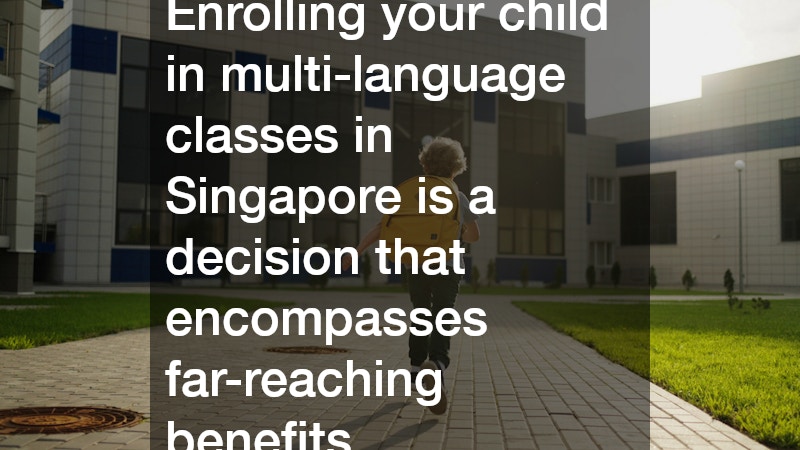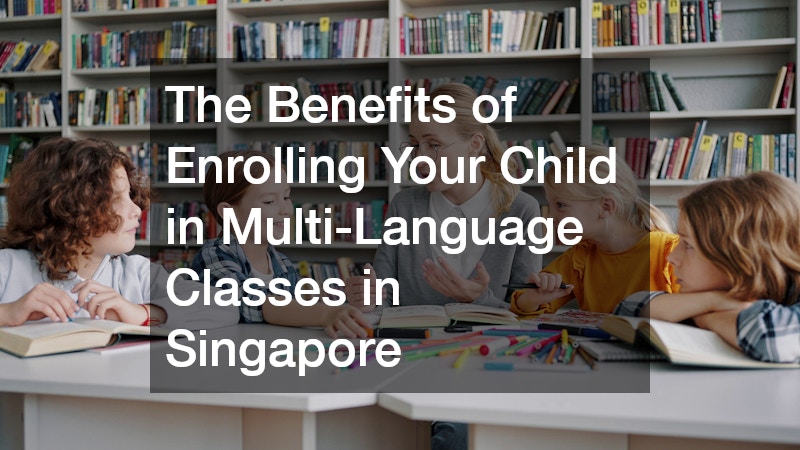In today’s interconnected world, the ability to communicate in multiple languages is increasingly becoming a crucial skill. This is particularly true in Singapore, a cosmopolitan melting pot where diverse cultures and languages converge. As parents recognize the advantages, there has been a rising trend towards enrolling children in multi-language classes in Singapore. These classes not only enhance communication skills but also open doors to diverse cultures and offer cognitive and social benefits.
In this article, we will explore the extensive benefits of enrolling your child in multi-language classes in Singapore. From cognitive development to cultural awareness, the advantages are manifold and impactful.
Cognitive Development Benefits
One of the primary benefits of multi-language classes in Singapore is the cognitive development they promote in children. Research indicates that bilingual or multilingual children often outperform their monolingual peers in various cognitive tests, including those assessing creativity and problem-solving. Learning multiple languages enhances brain flexibility, leading to improved executive function, memory, and critical thinking skills. Studies show that these cognitive advantages begin in childhood and extend well into adulthood, suggesting that early exposure to multiple languages leads to lasting benefits. In Singapore, where academic excellence is highly valued, multi-language education aligns well with parents’ desire to provide their children with the best start in life.
Multi-language learning involves complex processes that sharpen a child’s ability to focus and switch attention between different tasks. As students engage with different linguistic systems, they develop superior metalinguistic skills, such as phonological awareness and symbolic representation. These enhanced skills contribute to improved literacy in their native language and other academic domains. Moreover, multilingual individuals often display better multitasking abilities and enhanced adaptability in new situations. In the competitive educational landscape of Singapore, these cognitive skills are invaluable assets that positively impact academic performance and future career prospects.
Cultural Awareness and Sensitivity
In a multicultural society like Singapore, cultural awareness and sensitivity are vital competencies that help foster inclusivity and harmony. Multi-language classes serve as a gateway to diverse cultures, enabling children to appreciate and respect different traditions and perspectives. When children learn a new language, they also learn about the culture, history, and social norms associated with it. This holistic understanding cultivates empathy and open-mindedness, essential qualities in our globalized world. By understanding the cultural context of different languages, children become more adept at navigating multicultural environments, an invaluable skill in Singapore’s diverse society.
Furthermore, cultural sensitivity gained through multi-language education can strengthen interpersonal relationships. Children who study multiple languages often display increased social competence and empathy, allowing them to form deeper connections with others. In classroom settings, this translates to improved collaboration and communication skills, vital for group activities and projects. Additionally, understanding cultural nuances helps children avoid ethnocentrism, promoting a positive self-image and a healthy respect for others. These qualities, nurtured through multi-language study, empower children to become global citizens who thrive in culturally diverse settings.
Social and Emotional Advantages
Beyond cognitive and cultural benefits, multi-language education in Singapore enhances children’s social and emotional development. By engaging with diverse linguistic communities, children become more adaptable and confident in social interactions. The ability to communicate in multiple languages fosters a positive self-image, increasing self-esteem as children realize their capacity to connect with a broader range of people. This confidence is beneficial in various social contexts, from school activities to community engagements. In Singapore, where diversity is celebrated, being multilingual is seen as an asset that enhances one’s social capital and emotional well-being.
Moreover, learning multiple languages can mitigate social anxiety and enhance resilience in unfamiliar situations. Children who are exposed to different languages develop flexible communication strategies, which can ease anxiety in diverse settings. This skill is vital for building resilience and adaptability in an ever-changing world. Additionally, Singapore’s multilingual environment provides an ideal platform for children to practice these skills daily, further reinforcing their social-emotional competencies. As children navigate their educational and social journeys, these foundational skills contribute to their overall well-being and success.
Enrolling your child in multi-language classes in Singapore is a decision that encompasses far-reaching benefits. From enhancing cognitive abilities to deepening cultural understanding and building social-emotional skills, the advantages are multifaceted and profound. In today’s competitive and interconnected world, the ability to speak multiple languages is not only a practical skill but also a transformative experience that shapes a child’s worldview. As Singapore continues to foster its multicultural identity, embracing multilingualism becomes ever more relevant and necessary. By investing in multi-language education, you are equipping your child with tools that will serve them well throughout their life, empowering them to succeed in a globalized society.






